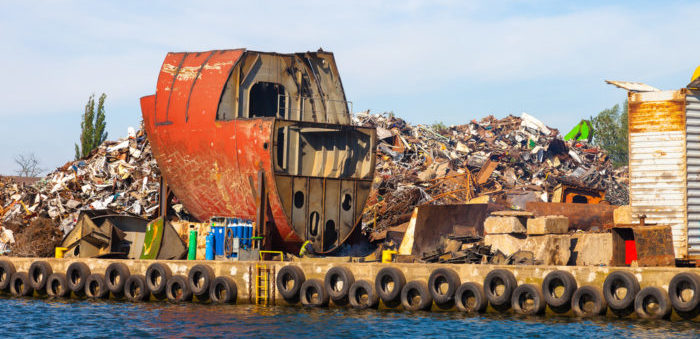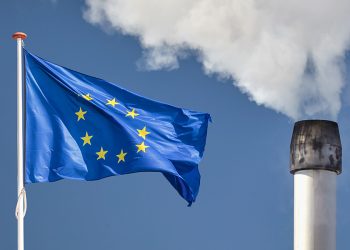During the second SAFETY4SEA Singapore Forum, Mrs. Ina Lutchmiah, Specialist Counsel (Solicitor, England & Wales), Wikborg Rein Singapore Pte Ltd opened the second panel by sharing key challenges with respect to the regulatory framework for transboundary movements for recycling. Touching upon the Hong Kong Convention and the Basel Convention, she moved forward by presenting compliance challenges and legal implications associated with transboundary movements for recycling originating from the EU and outside the EU.
Over the last 4 to 5 years, we have been busy advising clients in connection with transboundary movements for recycling, mainly of drilling rigs but also vessels. There are two key conventions: the Hong Kong International Convention for the Safe and Environmentally Sound Recycling of Ships, 2009 (the “Hong Kong Convention) and the Basel Convention on the Control of Transboundary Movements of Hazardous Wastes and Their Disposal, 1989 (the “Basel Convention”). The Hong Kong Convention seeks to minimize and, to the extent possible, eliminate risks to human health and to the environment arising from ship recycling, but it does not address the transboundary movement of assets for recycling and is not yet in force. On the other hand, the Basel Convention which addresses transboundary movements for recycling is in force although it is often overlooked. The Basel Convention regulates transboundary movements of hazardous waste for recycling, and it imposes a prior informed consent regime so that the states of export, import and any transit states need to approve the movement before it can go ahead.
[smlsubform prepend=”GET THE SAFETY4SEA IN YOUR INBOX!” showname=false emailtxt=”” emailholder=”Enter your email address” showsubmit=true submittxt=”Submit” jsthanks=false thankyou=”Thank you for subscribing to our mailing list”]
Waste under the Basel Convention is defined in such a way that a ship becomes waste from the minute the owner forms the intention to recycle it and of course that intention is formed much earlier than the actual sale of the vessel for recycling. Marine assets almost always contain quantities of hazardous materials such as asbestos, PCBs and mercury. So a ship which is to be sold for recycling will almost always constitute a hazardous waste and movements of hazardous wastes which are undertaken without prior informed consent constitute illegal traffic.
187 states out of 193 UN member states are parties to the Basel Convention, so it is effective in most jurisdictions. A notable exception is the USA which signed the Basel Convention in 1990 but has yet to ratify it. The Basel Convention is an agreement between states, so it is not directly applicable to private parties. Each state party to the Basel Convention is required to implement the Basel Convention in its own local laws and can implement more onerous requirements. Owners of end-of-life marine assets need to carry out local due diligence to understand and manage the conflicting requirements in the states of export and import and in any transit states.
The EU implemented the European Waste Shipment Regulation in order to implement the Basel Convention within EU law. The European Waste Shipment Regulation applies to all wastes whether or not hazardous. It is directly applicable in all EU member states and bans the export of waste from the EU for (i) disposal outside the EU and EFTA and (ii) recovery to any location outside of the OECD.
Once an intention to scrap has been formed, usually well in advance of any contract for sale for recycling, a transboundary movement of such marine asset originating from an EU member state can only be undertaken in compliance with the European Waste Shipment Regulation unless the marine asset is EU-flagged. The recent decision by the District Court of Rotterdam in the Seatrade matter confirmed that ships designated for recycling constituted “waste” for the purpose of the European Waste Shipment Regulation notwithstanding that they were still in commercial service and carrying cargo during part of the voyage to their final destination.
The EU has also more recently implemented the European Ship Recycling Regulation which came into force fully as of the 31st of December 2018 and seeks to implement the standards of the Hong Kong Convention in advance of the Hong Kong Convention coming into force. The European Ship Recycling Regulation also controversially seeks to modify the application of the Basel Convention in the EU.
The European Ship Recycling Regulation has a direct impact on ships flying the flag of an EU member state unless such ships are excluded from its scope. As from the 31st of December 2018, ships flying the flag of an EU member state will (unless excluded from the scope of the European Ship Recycling Regulation) fall outside the scope of the European Waste Shipment Regulation and can only be recycled at one of the approved yards on the European List.
Whilst most EU-flagged commercial vessels fall within the scope of the European Ship Recycling Regulation, some vessels fall outside its scope, namely:
- Naval vessels and ships owned or operated by a state and used only on government non-commercial service;
- Ships of less than 500 gross tonnage (GT); and
- Ships operating throughout their life only in waters subject to the sovereignty or jurisdiction of the Member State whose flag the ship is flying.
Such excluded vessels will remain subject to the European Waste Shipment Regulation.
As a result of the European Ship Recycling Regulation, there are now two different regimes that apply to EU and non-EU flagged vessels resulting in substantially different rules applying to ships departing for recycling from the EU based solely on the vessel’s flag. For example, a non-EU flagged vessel cannot undertake any transboundary movement once the intention to recycle has been formed and without prior consent. Whereas an EU-flagged vessel can continue to trade and move freely at least within the EU, even though an intention to recycle has been formed.
With regard to recycling yard locations, a non-EU flagged vessel can be exported from an EU member state for recycling in the OECD only, so this limits the choice of yards based on location rather than based on sound environmental practices and capabilities. An EU-flagged vessel must be recycled at one of the yards on the European List, such yards having been chosen based on their sound environmental capabilities rather than geographical location. A non-EU flagged vessel cannot, for example, be exported from the EU to India for recycling. But if an Indian yard were to be added to the European List in the future, then an EU-flagged vessel could in future technically be exported from the EU to India for recycling.
In terms of the actual regulatory approval process, obtaining prior informed consent for the transboundary movement of a non-EU flagged vessel is much more complicated and time consuming compared to the approval process for a EU-flagged vessel. So, there is quite a divergence in regimes as a result solely of the vessel’s flag.
Seller beware, the European Ship Recycling Regulation seeks to exempt the majority of EU-flagged commercial ships from compliance with the European Waste Shipment Regulation, but it doesn’t provide any exemption from other prohibitions which are relevant to ships going for recycling, such as prohibitions on the export of ozone depleting substances, mercury and fluorinated greenhouse gases. The legality and the effectiveness of the EU’s attempted exemption of EU-flagged ships from compliance with the European Waste Shipment Regulation and the Basel Convention regime in general is questionable in some respects.
For example, the European Ship Recycling Regulation will not exempt the owner of an EU-flagged ship which is physically located or transiting through a state outside of the EU from compliance with the domestic legislation there which will most likely be based on the Basel Convention. As a way of a practical example, a Maltese-flagged vessel which is sold as is in Singapore for recycling will be subject to Singapore’s laws implementing the Basel Convention.
However, the owner of that EU-flagged asset will also need to ensure that that ship is only recycled at one of the yards on the European List and, to the extent that the EU-flagged vessel is exported from a non-EU jurisdiction, then the European Ship Recycling Regulation seems ineffective in replacing the Basel Convention regime. If it is exported from an EU jurisdiction to a non-EU jurisdiction, then compliance with the European Ship Recycling Regulation is only half the story. The movement will also need to comply with the importing country’s regulations and if it does not, then there is a risk that the country of import will exercise take-back obligations and force the owner to take the asset back to where it originated from.
The seller, being the owner of the vessel as it becomes waste and being considered as the producer of such waste, has the obligation to comply with the relevant transboundary movement regulatory regime(s). Sale of the vessel to a third-party cash buyer for recycling will not insulate the seller from residual liabilities in the event that the buyer fails to comply with the relevant transboundary movement regulatory regime(s). So the seller needs to consider carefully whether to seek the transboundary movement approvals itself or delegate the obtaining of such approvals to a third-party buyer at the seller’s peril.
Compliance with the Basel regime, yes, is a slightly complicated process and there is a lot of paperwork, but the cost of compliance is not high compared to the risks of prosecution, risks of being in breach of representations and warranties within your financing documents, your insurance, your contracts and of course the massive risk of reputational damage to companies.
The NGOs and particularly the NGO Shipbreaking Platform, have been very active in monitoring movements which could constitute illegal traffic and state prosecutors have been much more active in recent years in prosecuting such illegal movements.
Above text is an edited version of Mrs. Ina Lutchmiah’s presentation during the 2019 SAFETY4SEA Singapore Forum on 14 November 2019.
View her presentation bellow
The views presented hereabove are only those of the author and not necessarily those of SAFETY4SEA and are for information sharing and discussion purposes only.
About Ina Lutchmiah, Specialist Counsel (Solicitor, England & Wales), Wikborg Rein Singapore Pte Ltd

Ina Lutchmiah is a Specialist Counsel (Solicitor, England and Wales) at Wikborg Rein’s Singapore office where she leads the transactional practice. Her main practice lies within the shipping, offshore and energy sectors assisting international clients with long-term floating production charters, sale and purchase agreements, joint ventures and corporate structures, shareholder agreements and project related contracts. Ina has particular expertise in LNG and recycling/decommissioning projects.
Ina is recommended for oil and gas projects and ranked as a “Rising Star” in the Legal 500 United Kingdom 2020 edition.






























































